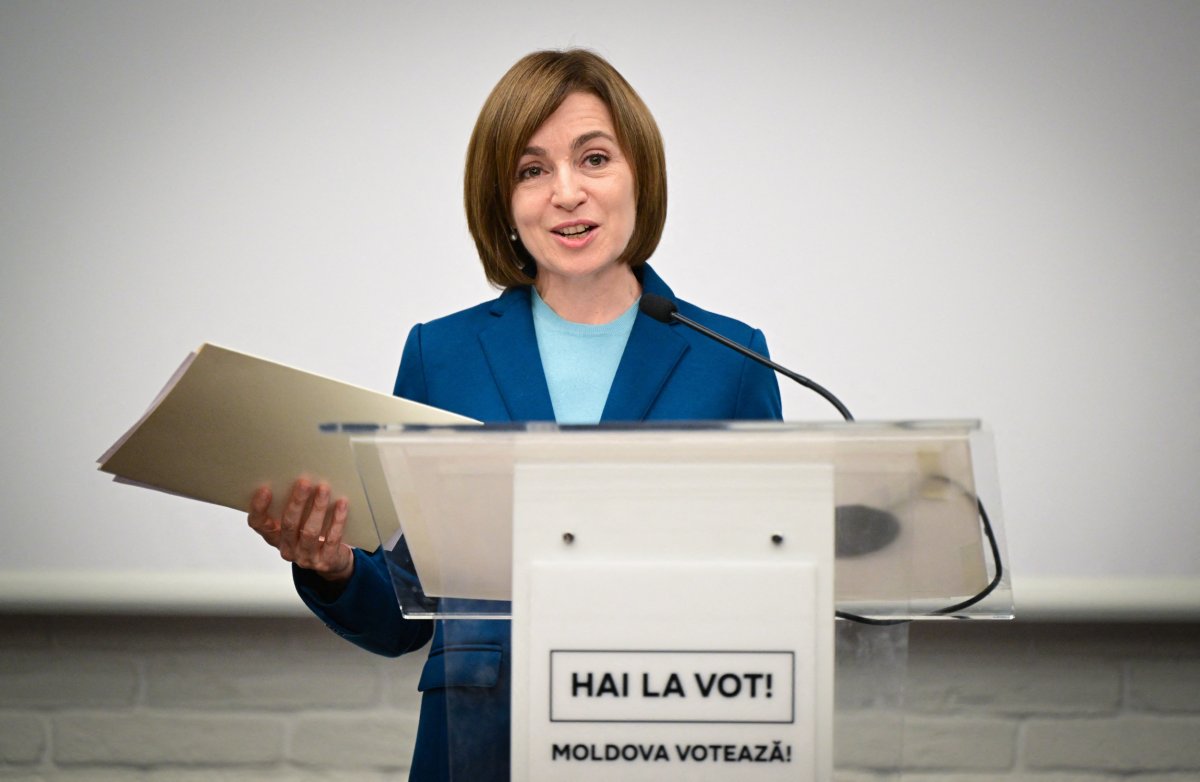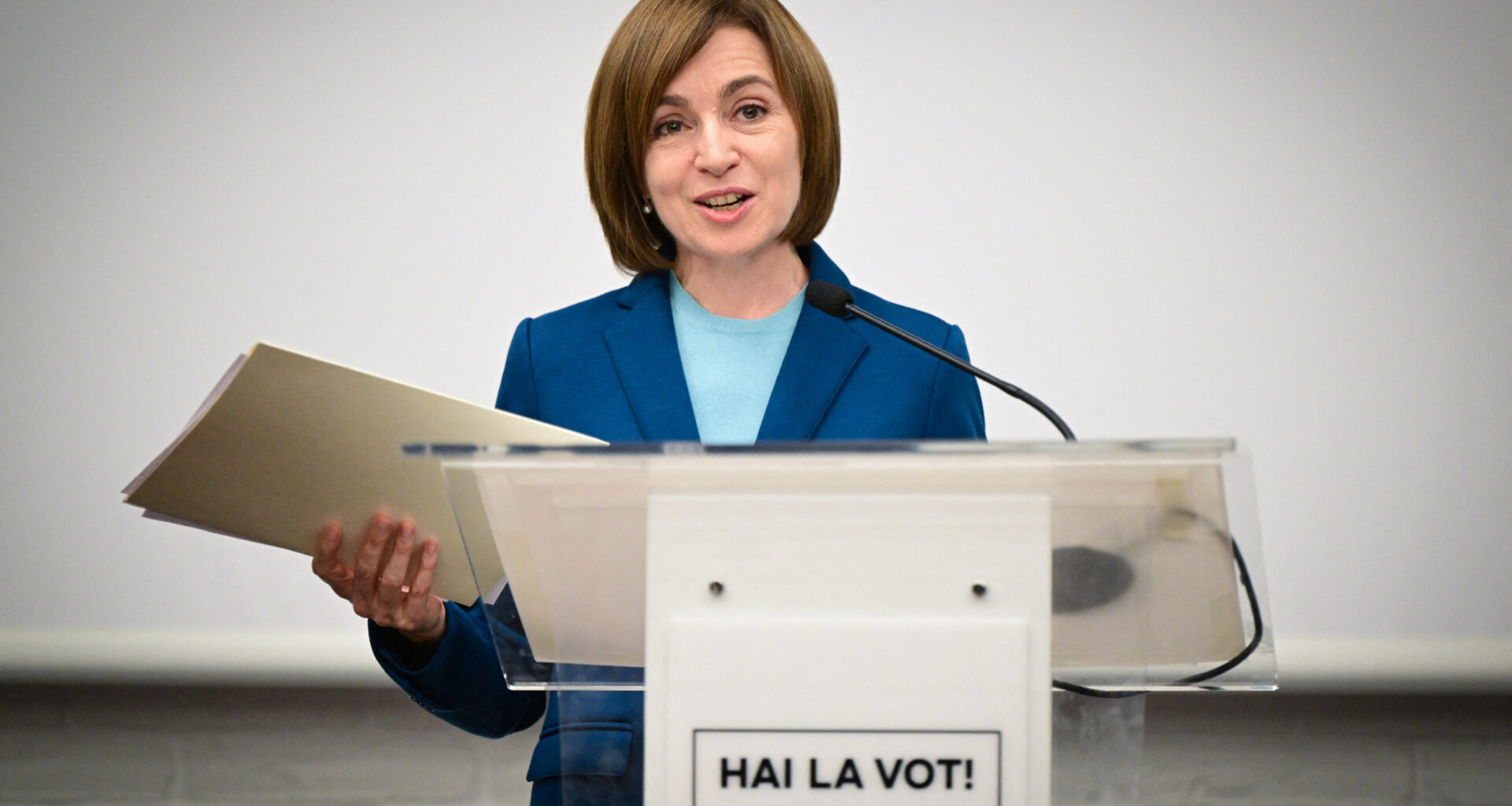Russia is trying to interfere in Moldova’s parliamentary elections and disrupt its ambitions to join the European Union, according to media investigations.
Bloomberg reported a Kremlin plot to undermine the chances of Moldovan President Maia Sandu’s Party of Action and Solidarity (PAS) and ultimately remove her from power.
A separate probe by the BBC found that a Russia-funded network was trying to influence the outcome of the ballot on September 28 in which pro-Russian parties are challenging Sandu’s party.
Russia has repeatedly denied interfering in foreign elections and said claims that it meddled in last year’s presidential ballot in Moldova were a result of “Russiaphobia.”
Newsweek has contacted the Russian and Moldovan foreign ministries for comment.

Moldovan President Maia Sandu after winning the presidential election runoff, in Chisinau on November 4, 2024.
Moldovan President Maia Sandu after winning the presidential election runoff, in Chisinau on November 4, 2024.
DANIEL MIHAILESCU/Getty Images
Why It Matters
A former Soviet republic, Moldova is a battleground between pro-European and pro-Russian forces whose strategic significance is amplified by the presence of Russian troops in its breakaway state of Transnistria, which is under Moscow’s occupation, according to the Council of Europe.
The pro-European Sandu won the presidential election last year in a ballot beset by accusations that Moscow had bought votes, funneled cash through proxies to voters and used social media to sow fears about EU membership.
Reports that Russia is trying to disrupt Moldova’s parliamentary elections this month will add to concerns about Moscow’s intentions for the wider region following its invasion of Ukraine on February 24, 2022.
What To Know
Bloomberg said it obtained documents that showed Moscow’s plans to disrupt Moldova’s parliamentary election on September 28.
Aiming to undermine the PAS and Sandu’s plans for EU accession, the plot included recruiting Moldovans abroad to vote, deploying others to stage disruptive protests, and a disinformation campaign on social media.
Another plan from Russian President Vladimir Putin‘s executive office involved the use of compromising material to pressure public officials to disrupt the electoral process, according to Bloomberg.
The outlet said it could not confirm whether the plans were being implemented as the election campaign in Moldova ended this week, but two unnamed European government officials said it was “almost certain” they would be carried out.
In a separate investigation, the BBC said it had uncovered a Russian-funded network that offered payments to people willing to spread pro-Russian propaganda and fake news aimed at discrediting Sandu’s party.
The BBC said it found links between the network and fugitive pro-Kremlin oligarch Ilan Shor, who is sanctioned by the U.S. for “the Kremlin’s malign influence operations” and the non-profit organization Evrazia.
Participants were paid to recruit supporters of pro-Russian opposition parties and conduct so-called polls on behalf of a non-existent organization, the BBC said.
Moldova has started talks to enter the EU and Sandu’s party has promised to kick-start the process. But her party faces a challenge this month from several groups, including the nominally pro-EU Alternative Bloc and a pro-Russian party led by former Moldovan President Igor Dodon.
Bloomberg reported that documents showed Dodon had allegedly asked security services to monitor political opponents while in office, although Dodon has denied any wrongdoing.
In an open letter on social media, Dodon also accused the current government of illegally pressuring opposition parties.
Law enforcement agencies carried out more than 250 searches across the country in an investigation into plans to incite mass unrest and destabilization, Moldovan news outlet NewsMaker reported.
What People Are Saying
Alberto Nardelli, Bloomberg reporter, on X: “Documents reviewed by Bloomberg reveal Russia’s plans to disrupt and undermine this week’s elections in Moldova.”
Paula Erizanu, a journalist, wrote on X what Sandu said on national television: “Russia is trying to buy the votes of hundreds of thousands….The accomplices ‘have no homeland—only masters. They do not believe in Russia. They do not believe in Europe. They believe only in money.'”
Kaja Kallas, vice president of the European Commission, on X on June 4: “Moldova faces hybrid threats ahead of its elections. Russia is likely to use cash, content and coercion to meddle.
“Let there be no doubt: only the people of Moldova should decide their future – free from interference.”
What Happens Next
Chisinau, Moldova’s capital, has long warned against Moscow’s attempt to destabilize the country.
Moscow has not yet responded to the latest accusations of election interference in the country, but there will be anticipation ahead of the parliamentary ballot on September 28, especially after EU promises in July that Brussels would help the country defend itself against hybrid threats.
